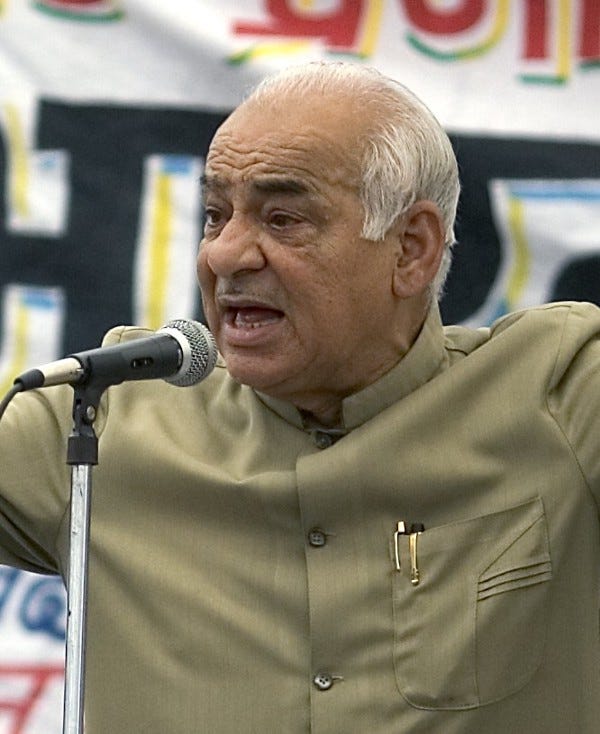Demonetizing small business
An earlier version of this article used the term Lala for trader, which could be taken as a derogatory reference. My apologies.

An earlier version of this article used the term Lala for trader, which could be taken as a derogatory reference. My apologies.
I am old enough to remember the BJP of Madan Lal Khurana. Not when he was the chief minister of Delhi, but much before, when he was the voice of the trader during the license raj. It was the traders who saved their fellow sardar shopkeepers in Lajpat Nagar during the 1984 riots.
Having said that, traders aren’t saints. They underreport their income, which is mostly in cash. They don’t pay their employees well. They are politically and socially conservative. No one argues that the trader is the backbone of a liberal society.
For many years, the trader saved the BJP from being the political arm of Nagpuri Brahmins. While they are socially conservative, their support wasn’t ideological as much as economic. Make it easier for us to do business.
With demonetization, the BJP has dumped the trader.
The trader is a species that lives on cash. Sure, they will accept Paytm or something else, but they aren’t made for the electronic economy. What’s their competitive advantage? The prices aren’t cheaper. What keeps the trader going is the personal relationship with the customer, who’s probably a neighbour or a friend.
Physical proximity isn’t that important anymore, once cash turns into electronic credit. We have seen that shift in the United States: Amazon is more attractive than Walmart, let alone your local mom and pop store.
However, the shift to Amazon in the US was grounded in the desktop web even as it has continued on to the mobile web. In India, we might see the shift to the mobile web in one go, leapfrogging web 1.o and 2.0. The mobile web might appear decentralized and democratic in principle, but in practice it will be even more of a winner take all system than the desktop web. Why do you think Facebook was offering “free” service?
The government has its reasons for shifting toward a electronic economy. The overt reason is the ending of corruption. The covert reason is increasing its control over our lives. We are creating a surveillance society in which all transactions are open to scrutiny.
Don’t believe me? Think about it this way: when all commerce is electronic, it’s easy to prevent you from using your own money. Let’s say you’re spotted at an anti-government rally one day and the next day the cash machine refuses to give you any money when go to an ATM. What are you going to do?
Financial centralization is an easy way to create a surveillance state without reading your email or other creepy activities.
Anyway, back to the trader
It’s possible my fears are overblown, though I am firmly convinced that we are going in a direction of full blown surveillance. The trader may not care much about surveillance, but he does care about his bottomline. Demonetization will affect that bottomline. Why has the BJP dumped him?
Kejriwal’s election offers a clue. I doubt AAP would have come to power without trader support. It does seem as if the BJP is shifting its financial core from the small business owner to the large corporate industrialist.
A large MNC will have no problem paying its employees through electronic means — it probably does so already. In contrast, a small business owner doesn’t want electronic payroll. Neither does a small factory owner.
Let’s assume — I think it’s a fair assumption — that the BJP (and perhaps the Congress as well) have shifted their fundraising away from the small guy to the big boys. Demonetization helps them in two ways:
It shifts economic power decisively toward the big corporates.
It makes it harder for their political rivals to raise money (since their sponsors are the small guys who don’t have cash anymore).
None of this controversial — in fact, it’s part of the propaganda of the demonetization campaign itself: how many times have we heard it that demonetization will prevent the Lalu’s, Mulayam’s and Mayawati’s from raising illegal funds?
What’s not being made explicit is the outcome of this “anti-corruption” process: even more concentration of economic, financial and political power in a few hands.
Demonetization, Aadhaar and other developmental efforts are designed to move India toward an American system of dominance by two (maybe one — that would make it into China!) parties, large corporates, a technocratic “liberal” class and the extremely wealthy.
This system will be legal, perhaps free of black money and efficient. But in reality, it’s a far more corrupt system than the one we have now.



